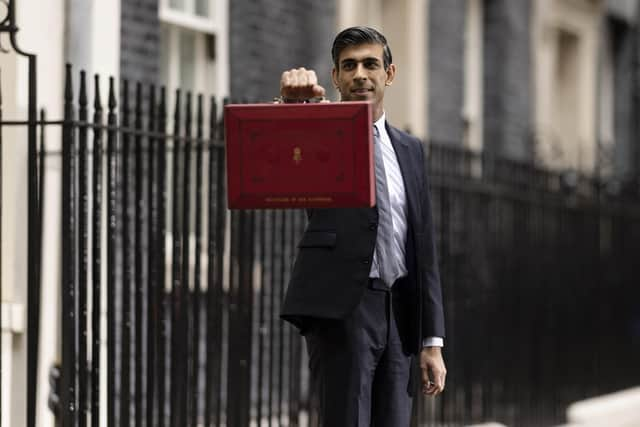Yorkshire's economic plight deepens as Rishi Sunak warned levelling up is being put at risk by cost of living crisis
A perfect storm of rising energy prices, dramatic increases in the price of key commodities and soaring rates of inflation is set to strike at the heart of finances of households and businesses from next month when the economic crisis is set to deepen.
Ahead of Chancellor Rishi Sunak’s Spring Statement on Wednesday next week, leading figures in the fight against poverty have warned that the financial plight of millions of people across the country is set to deepen.
Advertisement
Hide AdAdvertisement
Hide AdHowever, the situation in Yorkshire and the Humber is even more accentuated with many households already struggling to balance their budgets.


Exclusive data provided to The Yorkshire Post by the IPPR North think-tank has provided a deeply concerning snapshot ahead of predictions that energy bills are set to double from April.
A total of 17.5 per cent of homes in Yorkshire and the Humber are blighted by fuel poverty, twice the rate of the South-East where 8.6 per cent of households are affected.
Yorkshire and the Humber, the North-East and the North-West rank as the second, third and fourth regions respectively in terms of the number of households living in fuel poverty, according to the research.
Advertisement
Hide AdAdvertisement
Hide AdLow wages in the North coupled with poor insulation and a lack of energy efficiency in homes have compounded the problems.
IPPR North’s associate director for the energy, climate, housing and infrastructure team, Luke Murphy said: “Nobody, anywhere in the UK should be trapped in fuel poverty, yet with the fuel price cap rise set to hit families across the country next month, we can expect even more people to be pulled into fuel poverty, and for households in Yorkshire and Humber to be especially exposed.
“The cost of living scandal will have catastrophic consequences for too many people, through no fault of their own.
“Yorkshire and Humber, the North, and the country need to see bold short-term and long-term policy interventions from the Chancellor in next week’s Spring Statement to prevent this.”
Advertisement
Hide AdAdvertisement
Hide AdWhile escalating energy bills remain among the biggest concerns when industry regulator Ofgem’s price cap rises by more than 50 per cent from April 1, the cost of living has soared across all sectors.
Latest figures show average fuel prices are a record 165.9p per litre for petrol and 177.3p per litre for diesel.
Meanwhile, grocery prices rose at their fastest rate in more than eight years in February, as market analysts predicted the financial pressures for consumers would continue as a result of disruption to supply chains caused in part by the conflict in Ukraine.
Food price inflation hit 4.3 per cent last month, the highest since September 2013, as the price of savoury snacks, fresh beef and cat food increased the fastest.
Advertisement
Hide AdAdvertisement
Hide AdThe rate of annual inflation reached 5.5 per cent in January - a near 30-year high - but the Bank of England has predicted that the figure is set to reach seven per cent next month.
Economists fear that inflation could increase to a rate as high as nine per cent, largely due to the impact of the war in Ukraine.
Research published by the York-based Joseph Rowntree Foundation has shown that more than one in five people are living in poverty in England.
However, the figure is even higher in Yorkshire and the Humber, where nearly one in four people are locked into poverty.
Advertisement
Hide AdAdvertisement
Hide AdWhile the Government is increasing benefit payments by 3.1 per cent from next month, recipients will experience an income loss in real terms due to soaring rate of inflation.
The Joseph Rowntree Foundation’s Head of Economics, Dave Innes, told The Yorkshire Post: “There is very real fear for many households for what is going to happen, and this is in many ways far worse than the economic crisis of 2008.
“Back then, if people kept their jobs then they often emerged relatively unscathed, but the cost of living crisis is going to affect all sections of society.
“However, it is going to be particularly felt in the North of England and in regions such as Yorkshire and the Humber where lower wages already strain budgets and restrict opportunities to save.
Advertisement
Hide AdAdvertisement
Hide Ad“Regional inequalities have persisted for decades, and the Government needs to provide a long-term strategy to help tackle the problems that are only going to be accentuated by the rising cost of living.”
Jonathan Marshall, a senior economist at the Resolution Foundation, an independent think tank focused on improving living standards for those on low to middle incomes, added: "Everyone is feeling the squeeze at the moment, and while it will affect the upper and middle classes, it is being most keenly felt by those on lower incomes.
"There are tough choices ahead, with many people rationing their heating and cutting down on food bills, or falling further into debt."
The Treasury maintained it has ploughed billions of pounds into support to help alleviate the cost of living crisis.
Advertisement
Hide AdAdvertisement
Hide AdA spokesman said Ministers were acutely aware of concerns over rising costs, but support worth more than £20bn had been provided in this financial year and the next.
Measures include targeted support for energy bills, cutting the Universal Credit taper rate to help those on low incomes keep more of what they earn, and freezes to alcohol and fuel duties.
The spokesman added: “We continue to monitor the impacts that Vladimir Putin’s invasion of Ukraine is having on the cost of living here, so we keep our approach under review.”